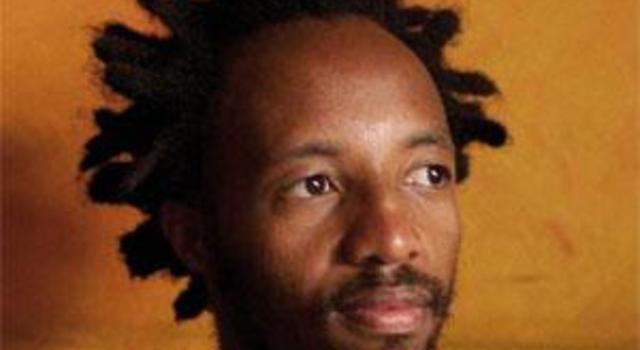
Thirteen Cents
K. Sello Duiker
(Ohio University Press)

Azure lives on the streets of Cape Town, South Africa. He's a young street kid. His mother and father are dead, and he has but one friend, Vincent. He says he doesn't do drugs because "it makes my head sore," but he does smoke pot, called "stop" or "skyf" in Africaans.He exists in poverty, but he also exists in a rich, poetic juncture of several languages. For instance, an alcoholic is a phuza-face (Zulu). His friends are referred to as wena (Xhosa). Someone who talks too much is nicely labelled windgat (Africaans). A young boy like Azure is known as a laitie (also Africaans, as is outie, a wiseguy). Like most Africans, he uses the Persian phrase for tip, baksheesh. "Buttons" from the English is the local slang for Quaaludes.
Azure claims to never have had a girlfriend. Much of his survival depends on selling his body to honkies known locally as moffies, and "One of the bastards once asked me if I was a moffie. And I told him him that I'm not a moffie. But it's strange that I never dream of doing it with a woman."
I just lie about it and say that it happens to me too even though it never has ... It worries me that I have never done it with a woman and that I've only been doing it with men even though I don't like them. They're hairy and ugly. What's there to like?
Azure has "blue eyes and dark skin." His eyes, he says, often got him in trouble. The other things that get him roughed up by the gang leaders on the streets at Sea Point are wearing the wrong color clothes and shoes (called veldskoene) and "trying to be white." In one long, exhausting beat-up scene Azure is worked over by a stooge of the gang leader Gerald. Azure's face is cut, several of his teeth fall out, and his ankle is broken. Gerald then tells him that he is now to be known as "Blue." Gerald has two of his gang members take him to the hospital where the doctor is told that he was punished for stealing. As he is beginning to operate on him, the doctor says to the nurse, "With the trouble he's been causing I have a good mind not to use a local anaesthetic."
§ § § This is pretty bleak stuff, but, evidently it made Duiker famous (before he died, a suicide at age thirty). The problem here is that there is no relief, neither for poor old Blue nor for the reader. He is endlessly being kicked, beaten, insulted, chased, harassed and raped. When he finally runs off to Table Mountain, he's convinced that he is being followed or that the people he meets are after the 13¢ he has in his pockets or that they want his body. "The madness is inside me," he repeats. The sun, he says, fills him with energy. "It mingles with the zol (pot) in my head and gives me fire ... Fire! Fire! I must give them fire, I tell myself. Higher."
The people he has known from before appear out of the blue and begin to babble. In fact, towards the end of Thirteen Cents, it comes to be almost all babble. The only sane moment (relatively) finds Blue being hustled by a rich white banker, Mr. Lebowitz.
"You've got the most incredible blue eyes for a ..."
"Darkie," I smile.
"Yes," he says awkwardly. "Are they real?"
That is the strangest question I've ever heard.
"What do you mean?" I ask and sit closer to him.
"I mean, are they contact lenses?"
"What?"
"Never mind. I guess they are real."
As Blue wanders up Table Mountain, he begins to have visions. He sees the rocks as "giants with strange hands from another world."
Maybe at night when no one is watching the rocks move. Maybe they walk all over the mountain...
My mother is dead. My father is dead, I say to myself and hear a booming explosion below that shakes the mountain. I crawl down quickly as rocks start falling around me. The sky is angry with darkness and purple fire. My heart nearly stops beating when I begin to see water at the edge of the mountains. I stop in my tracks and look at the remains of a roof and other debris floating near the water's edge. The heads of dead white bodies float like kelp.
"My mother is dead. My father is dead," he repeats again. The deafening sound of destruction fills the air.
Soon the whole mountain turns into an oven. I lie there and sweat with fear. When I open my eyes briefly I see hooves, claws and feet running in every direction. A hellish explosion comes from the sky. When the fireballs fall from the sky they make a frightening sound like a powerful machine tearing through something alive. Nothing seems to escape. The sun rules and it is harsh.
§ § § Thirteen Cents was written when Duiker was twenty-five years old. Had he lived longer, he eventually would have learned that you cannot stuff too much into a single work, unless you are a Tolstoi or a Fielding or a Proust. He has tried here to merge a picaresque tale of a poor boy of the streets of Cape Town living by his wits alone --- conjoined with a picture of Doomsday (or possibly, a boy's lurch into madness). Each of these has its virtues, but together, they just don't jell.
Commentators such as a Shaun Viljoen --- who writes a vivid introduction to this edition of Thirteen Cents --- try to bring some logic to this joining of ultra-realism and the supernatural. He credits it to Africa's long tradition of spirits and witches. But, as much as we may want it to fly, it is just too much.
Author Duiker was indeed talented. His vision of black life on the streets of post-apartheid South Africa is as rich, colorful (and despairing) as is his vision of the final days of humanity. But to merge his vision of the Day of Reckoning with the picaresque is asking too much of the characters, and too much of the novelistic form. It even, we suspect, demands too much of the young writer himself.

--- Scott W. Bing